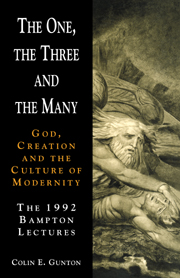Summary
When William Morris said that ‘Modernism began and continues, wherever civilisation began and continues to deny Christ’, he indicated that salient aspects of modern culture are predicated on the denial of the Christian gospel. The reason for this is in part to be found in the direction that Christian history has taken. For all of its unifying vision, the era of Christendom was dearly bought, that is to say, at the expense of certain dimensions of the Christian gospel which became effectively submerged. But in reacting against Christendom, the modern world has bequeathed equal and opposite distortions of human being in the world. It is for that reason that I am attempting in this book neither to react against modernity nor slavishly to follow its lead. Modernity is like all cultures, in being in need of the healing light of the gospel of the Son of God, made incarnate by the Holy Spirit for the perfecting of the creation. But it is unlike some in that the distinctive features of its plight derive from its rejection of that gospel, albeit for some understandable reasons. The gospel will therefore not be served by the mere denunciation of modern rejection, but by probing how it came to happen. Christianity is indeed offensive to the natural human mind; and yet it is often made offensive by its representatives for the wrong reasons.
- Type
- Chapter
- Information
- The One, the Three and the Many , pp. 1 - 8Publisher: Cambridge University PressPrint publication year: 1993



